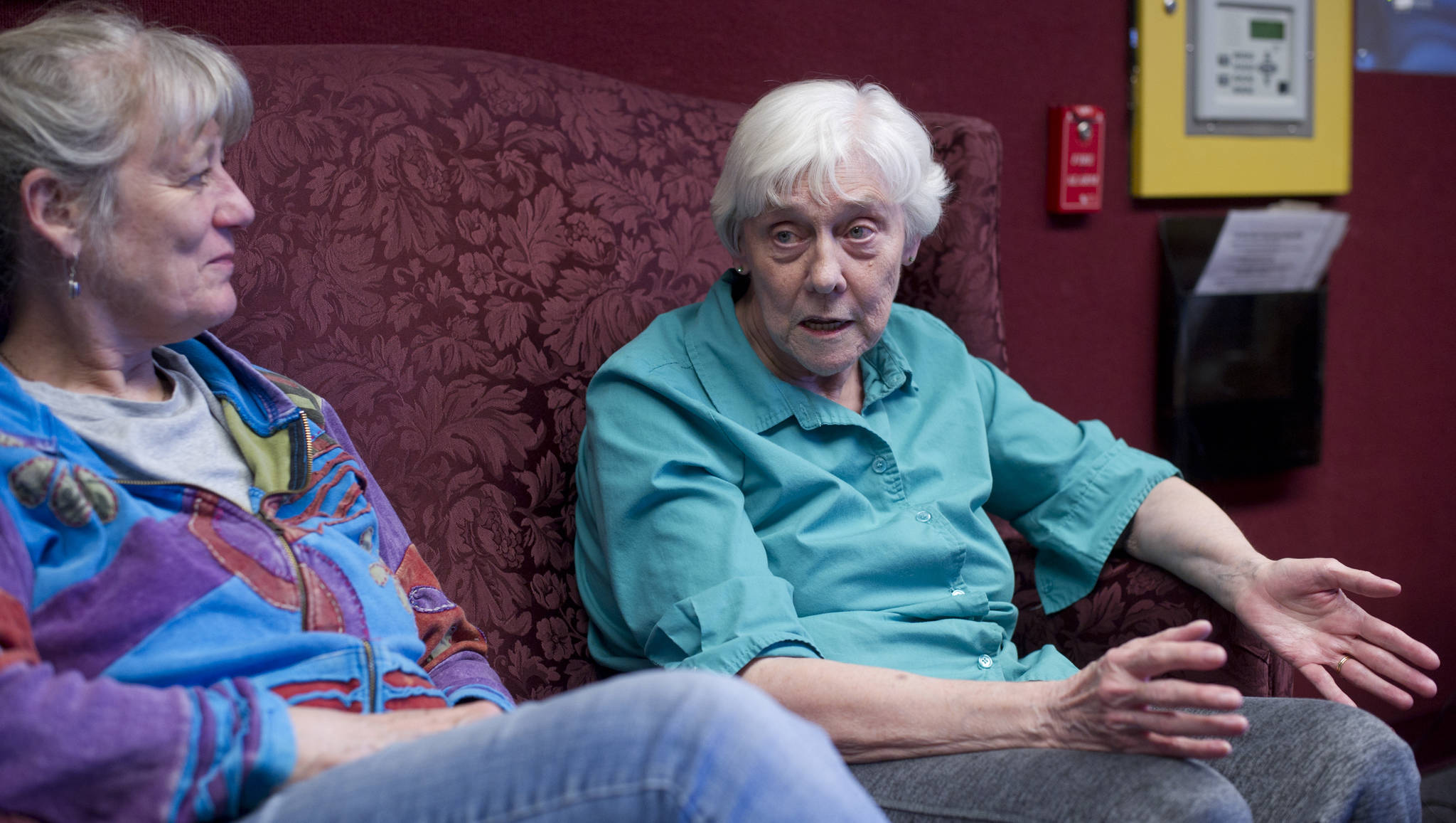Marion Rider has lived in Alaska since 1960.
The Alaska Senate may leave her homeless.
Included within the Republican-led Senate’s proposal for $276 million in budget cuts is a $6.5 million hit to the system of six Alaska Pioneer Homes, the state-supported centers for Alaska retirees.
That cut is more than 10 percent of the budget for the Division of Pioneer Homes, and it may mean the closure of the Pioneer Homes in Juneau and Palmer, the state has told residents.
Rider, who moved into the Juneau home at the end of 2016 with her husband, was among many residents interviewed Tuesday who said they simply don’t know what they’ll do if the home closes.
“As if Juneau doesn’t have enough homeless as it is,” she said.
Sen. Dennis Egan, D-Juneau, said the cut came as a surprise. He and his staff didn’t realize the impact of the missing money until the Senate passed its version of the state budget over to the House.
“They were shifting stuff, and we didn’t catch it,” he said. “I sure as heck know it now.”
Egan’s mother, Neva, lived in the Juneau Pioneer Home before her death, and Egan himself has been on the home’s wait-list since he turned 65.
“It’s horrible,” he said of the cut, and he hopes that it will be reversed in ongoing budget negotiations.
In the House, both Rep. Justin Parish, D-Juneau, and Rep. Sam Kito III, D-Juneau, expressed similar hopes.
“We’re on our side going to fight it, and I think we’ll succeed,” Parish said.
“Definitely call and write your legislator or other legislators,” Kito said.
This fiscal year, the state is funding the Pioneer Homes with $62.2 million. Gov. Bill Walker proposed increasing that to $62.6 million in the fiscal year that starts July 1.
He proposed the increase in response to requests from the Division of Pioneer Homes for greater nursing support, and after cuts last year.
The House of Representatives heard and accepted Walker’s request.
The Alaska Senate heard Walker’s request, rejected it, then cut $6.5 million more.
In the Senate’s budget, the division is slated to receive only $56 million. Members of the Republican-led Alaska Senate majority say that because Walker could shift funding from elsewhere to cover the gap, the possible closure is his responsibility.
The difference between the House and Senate budgets is now up for negotiation.
At the Juneau Pioneer Home, administrator Gina Del Rosario said she has already been forced to cut the home’s number of available beds from 48 to 46. She tried to keep word of the possible closure quiet, but she told residents on Monday that it might happen.
Rider, who sat on a mobility scooter while petting a small dog, said she can’t imagine life beyond the Pioneer Home.
“I don’t think we could ever – if we lived on our own somewhere – find help like we have here,” she said.
Phyllis Woodman, now 81, came to Alaska in her 20s and has lived at the home for about four years.
“I think the whole idea is atrocious,” she said of the possible closure.
She added that if people would simply visit the home, they would understand why it matters.
Betty Daugherty, sitting near Woodman, said she and her husband have lived in Alaska for more than 65 years. She was a high school science teacher; he was a state employee.
“We could’ve moved south,” she said, but they chose to stay in Alaska.
They have six children, five near Juneau, and they wanted to keep their ties to home.
“If you go south, you’re quite isolated,” she said.
The Juneau home sees a steady stream of visitors on most days. Some bring cookies, some come simply to talk. On Tuesday, Alaskan Brewing founder Geoff Larson brought his dog for a visit.
Alaska’s Pioneer Home system was established in 1913, when a former U.S. Marine Corps barracks was used to house the elderly in Sitka. That home still operates but has been joined by five others: one each in Juneau, Ketchikan, Anchorage, Palmer and Fairbanks. The Juneau home was built in 1988, and there’s an extensive wait-list to get in, Del Rosario said.
According to her figures, 101 people are ready to move into the home as soon as there is a vacancy. Another 1,955 – including Egan – have signed up for the wait list but aren’t yet ready to move in. The home operates on a first-come, first-served basis, and any Alaskan can join the wait list at age 65. There’s no cost to sign up, only a cost when you’re admitted.
The wait can be years, and even with full funding, the homes can’t help everyone.
“Some of them, in the process, die waiting,” Del Rosario said somberly.
• Contact reporter James Brooks at james.k.brooks@juneauempire.com. .or call 419-7732.
• Contact reporter James Brooks at james.k.brooks@juneauempire.com or call 419-7732.

